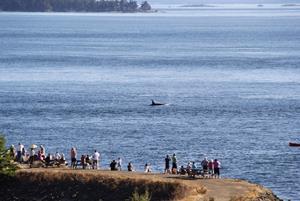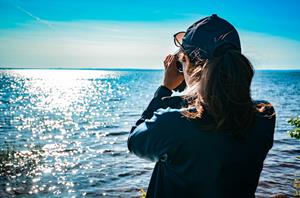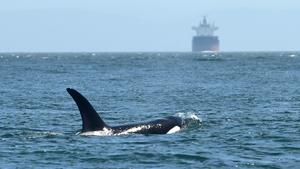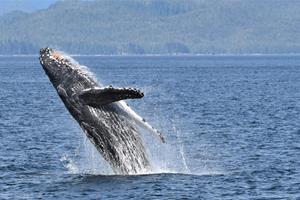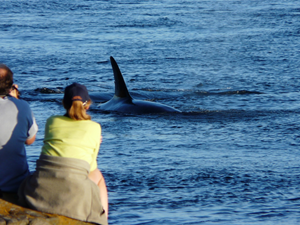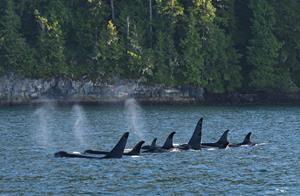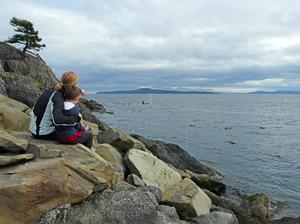Powered by the Public: New Study from Ocean Wise Shows Citizen Science Works
New research confirms the accuracy of citizen science reports in mapping whale populations
See Photos here.
VANCOUVER, British Columbia, Aug. 06, 2025 (GLOBE NEWSWIRE) -- A new study from Ocean Wise confirms just how powerful citizen science can be. Assessing Cetacean Habitat Suitability in the Northeast Pacific From Citizen Science Data, published in the Journal of Biogeography, sought to find out if citizen-reported whale sightings can be trusted to model critical whale habitats. Research confirmed the answer is yes, sightings collected by everyday observers can power real scientific breakthroughs—and help protect whales in the process.
For decades, marine scientists have faced an enormous challenge: how do you study animals that spend most of their time underwater, travel thousands of kilometers, and only surface for moments at a time? Some species, like humpbacks, migrate up to 20,000 km every year (that’s like swimming from Vancouver to Miami and back again twice). Tracking movements on that scale takes more than just research teams; it takes a network of watchful ocean-goers.
Understanding whale movements, social behavior, and health takes a huge amount of data, which is where citizen science comes in. Citizen science refers to the practice of public participation in scientific research. It involves everyday people—often volunteers—collecting data, analyzing results, or helping design experiments to support scientific studies.
For this study, researchers looked at twenty years of whale and porpoise sightings submitted to the Ocean Wise Sightings Network. Using this data, researchers created species distribution models (SDMs) for the 10 most common cetaceans on BC’s coast.
To address the fact that people tend to spot whales more often along busy ferry routes or near coastal communities, the team carefully accounted for these reporting biases. They integrated environmental factors measured from satellites like sea surface temperature, depth, and chlorophyll levels into their models to predict where suitable whale habitat is likely to be found.
The models accurately predicted seasonal habitat hotspots, like summer concentrations along the continental shelf near Vancouver Island and Haida Gwaii, and winter use of nearshore waters in BC and Washington. For key species like humpbacks, fin whales, harbour porpoises, and Dall’s porpoises, these citizen-science–based predictions closely matched results from dedicated scientific surveys.
These findings reinforce that citizen science data, when properly collected and curated, can hold up to scientific scrutiny and deliver real-world conservation value.
“As human activity and climate change continue to reshape marine ecosystems, understanding habitat preferences is crucial for conservation. These sightings are not just numbers; they are the bridge between people, science, and conservation,” said Dr. Chloe Robinson, study co-author and Advisor and Technical Lead at Ocean Wise. “This research confirms that everyday sightings can be more than just exciting moments, they’re essential pieces of a scientific puzzle.”
With robust models created from community-contributed data, scientists can:
- Pinpoint critical habitats that need further research or protection.
- Track shifts in species distribution due to climate change or human development.
-
Guide marine spatial planning and inform policy that protects whales where they’re most vulnerable.
The Ocean Wise Sightings Network turns everyday sightings from coastal communities, mariners, and tourists into powerful tools for whale conservation. As one of Canada’s longest-standing citizen science programs, the OWSN has collected over 25,000 verified sightings of whales, dolphins, porpoises, and sea turtles over the past 22 years. Each sighting feeds into one of the most comprehensive cetacean databases in North America and informs alerts to the Whale Report Alert System, alerting large vessels to the presence of whales to reduce ship strikes. Data has directly contributed to over 875,000 real-time alerts.
Keep the momentum going: here’s how the public can help whales
-
Join the Ocean Wise Sightings Network
Submit your whale sightings using the Whale Report App. Every report helps alert nearby vessels, prevent ship strikes, and support ongoing research.
-
Be Whale Wise
If you’re boating in coastal waters, always follow Be Whale Wise guidelines. Keep your distance, reduce speed, and minimize noise - especially around killer whales.
-
Stay Curious and Informed
Follow the latest whale research and conservation efforts. Visit ocean.org to learn more and share these stories with others.
-
Appreciate and Celebrate Citizen Science
Not all heroes wear lab coats. Citizen scientists are the backbone of modern whale research. Every observation is a small but critical part of protecting marine ecosystems.
-
Access the Data
Researchers, educators, and decision-makers: find out more about accessing OWSN data by emailing sightings@ocean.org
Media Contact
Nic Schulz
Director, Communications and Engagement
pr@ocean.org
About Ocean Wise
Ocean Wise is a global conservation organization on a mission to build communities that take meaningful action to protect and restore our ocean. Through research, education, innovation, and collaboration, we are turning the tide on three major ocean challenges: plastic pollution, overfishing and climate change. By creating communities of concern that include industries, governments, and everyday citizens, we create a future where our ocean and the people who depend on it can thrive. Ocean Wise is headquartered in Vancouver, British Columbia with work reaching over two dozen countries around the globe.
Photos accompanying this announcement are available at
https://www.globenewswire.com/NewsRoom/AttachmentNg/fbb03f02-84e5-4676-83da-8dafdfab4ee2
https://www.globenewswire.com/NewsRoom/AttachmentNg/575c399c-17b3-4236-8703-060e10d309b2
https://www.globenewswire.com/NewsRoom/AttachmentNg/b12bcfb3-eafc-4f36-aa43-3cfd4e21af7c
https://www.globenewswire.com/NewsRoom/AttachmentNg/45fa6236-e7ed-4553-b4e7-5d95e63a2544
https://www.globenewswire.com/NewsRoom/AttachmentNg/29b6e168-0edb-464e-b2cb-6b2c2a8b4323
https://www.globenewswire.com/NewsRoom/AttachmentNg/d3292484-b8fd-4e4d-ac6c-9360b9912802
https://www.globenewswire.com/NewsRoom/AttachmentNg/0540d1e4-9d3b-4681-b92f-4f621775d4d6

Citizen science in action
Citizen scientists spotting whales off the coast of B.C.
Citizen science in action 2
A young citizen scientist looks for whales to report to the Ocean Wise Sightings Network
Orca in the path of a ship
An orca whale in the path of a tanker ship.
Humpback Whale Breaching
A humpback whale breaching off the coast of B.C.
Citizen science in action 3
Citizen scientists spotting whales off the coast of B.C.
Orca whales swimming in a pod
A pod of orca whales swimming.
Citizen science in action 4
Citizen scientists spotting whales off the coast of B.C.
Legal Disclaimer:
EIN Presswire provides this news content "as is" without warranty of any kind. We do not accept any responsibility or liability for the accuracy, content, images, videos, licenses, completeness, legality, or reliability of the information contained in this article. If you have any complaints or copyright issues related to this article, kindly contact the author above.


